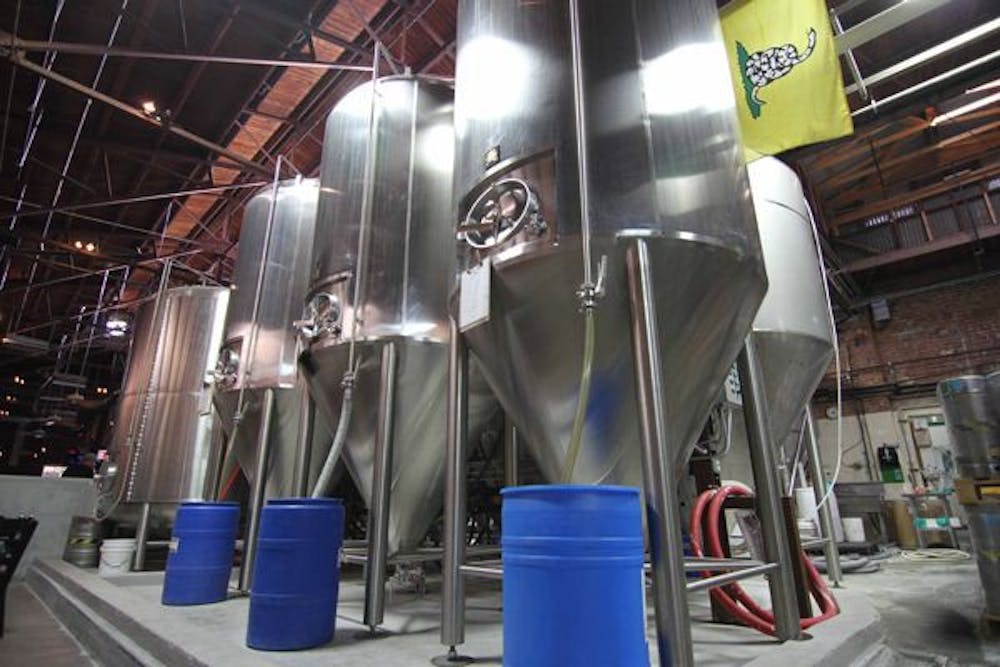Whether you prefer pumpkin ale or a Coors Light, the rapid increase of craft beer is something that can’t be ignored. Craft currently makes up 11 percent of all beer sales in the country, outselling macro beer Budweiser in the process.
Macro companies are noticing — and while some are taking the rise of micro brews a tad personally, others are meeting them in a more direct fashion.
In November of last year, San Diego brewer, Ballast Point, was purchased by beverage company, Constellation Brands for one billion dollars. The marine-themed brewer, known for their "Sculpin" line of beers, "will continue to operate as a stand-alone company with its existing management team and employees running the day-to-day operations," according to a press release on Constellation's website.
September saw Heineken purchasing a 50 percent stake in California brewer, Lagunitas which, according to the brewer, gives them global distribution abilities. That same month, MillerCoors picked up San Diego-based Saint Archers, drafting it into its Tenth and Blake Beer Company craft division.
In December, Anheuser-Busch’s parent company, Anheuser-Busch InBev, capped off the year with a purchase of local Arizona brewer Four Peaks. They join the likes of Seattle's Elysian Brewing Company and Chicago's Goose Island in a collection of six craft purchases that InBev is calling "The High End."
The monetary details of the Four Peaks purchase are still unknown. According to the Arizona Republic, owner Andy Ingram said "Nothing will change," and that the deal was meant to expand distribution.
"We are not going anywhere," Ingram said. "There are no pay cuts. It will be business as usual. It almost sounds too good to be true, but it is."
Allen Husayno, owner of Phoenix's Craft Beer Hop Stop, said his customers have been talking about the slew of purchases. With Ballast Point, he and his patrons don't see anything changing with the brewery's content. However, with Four Peaks, Husayno said that some customers have stopped buying the beer since the sale, while others are more optimistic.
"They're saying that it's not a bad thing if they (InBev) buys them out, because it makes them more available," he said. Husayno himself enjoys the company's KiltLifter lager.
Additionally, customers have commented on the content of the beers, saying that the purchase could go to improving Four Peaks' formula — particularly its India pale ales. He went on to say that it depends on what InBev's intentions are, the obvious negative being that it would seek to get rid craft beers.
"We'll still carry it — unless they alter the formula where they decide to go cheap or change the quality for the worse and water it down," Husayno said.
Jason Ayers, resident beer geek and creative director at Flowers Beer and Wine in Downtown Phoenix, didn't mince words on the purchases.
"They're the enemy, the big beer companies," he said. "Historically, they've shown over and over again that they will cheapen the product to increase their profit margins."
Ayers recalled the likes of brewers Bass and Hoegaarden, saying that despite promises from the parent companies not to alter the product in any form, it happened regardless.
"As soon as they get the opportunity, they will start cutting the product with rice, corn and other adjuncts, decreasing the amount of barley," he said. "Traditionally, beer is made with barley, oats and other cereal grains like rye."
Though he said that it was a good deal for the owners of the brewery, Ayers predicted that its product would change within three years.
"Four Peaks beers will be altered and will be produced elsewhere," he said. "It makes economic sense for them. When their responsible to their shareholders to turn profits every year, they have to cut where they can. And it's usually the product itself."
In terms of the Ballast Point deal, Ayers said because Constellation is more interested in the importing and exporting of beers, the content of the beverages should be left alone.
Clayton Steffen, owner-operator of Phoenix bar,The Whining Pig, said macro breweries see micros as a threat.
"They are getting a little scared because their market share has started to slip," he said. "Word on the street is that InBev wants to buy a craft brewery in every state."
Steffen said the result of that would be a push-out of other craft breweries in those states through mass production and price reduction of the company's acquired breweries. This is to regain lost market share by making sure their product is the best-selling in comparison to independent breweries. He also said that InBev was buying hop fields in mass quantities which would make it difficult for smaller breweries to obtain the ingredient.
In terms of the Four Peaks sale, Steffen said it was disappointing yet understandable, but he stressed that craft enthusiasts needed to support local breweries.
Sticking to the bar's craft mantra, he plans on removing Four Peaks and Golden Road beers from the menu once he's sold out of them. Steffen has already stopped buying Goose Island and Lagunitas beers, but still carries four domestic brands (including Coors and Stella Artois) for those that want those options.
In terms of macros versus micros, Steffen encouraged drinkers to, "Look up who's not owned by the big guys and make sure you stick with those guys. Stay strong on your local people."
"We're David, and (the macros) are absolutely Goliath," he said.
Related Links:
Four Peaks to open new brewery in south Tempe
Alcohol will redefine Phoenix in the best way possible
Reach the reporter at Damion.Julien-Rohman@asu.edu or follow @legendpenguin on Twitter
Like The State Press on Facebook and follow @statepress on Twitter




